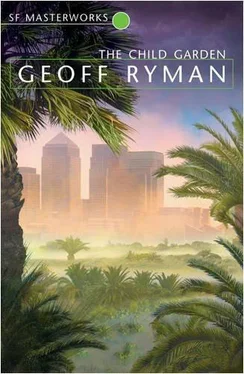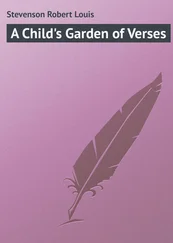The children fell silent. They waited. Stars wavered overhead, screened by the rising air.
Then came Bugs Bunny.
He was huge as well, but flat, a drawing. Bugs came dancing, a kind of Chinese wobble. He gave his audience a knowing, narrow-eyed look. With the voice of an American gangster, he began to warble a Chinese song.
The audience of children roared with disbelief and delight. Bugs paused to bite off the tip of a carrot, and continued to sing with his mouth full. He danced in a circle round the Crab Monsters and crammed a carrot into each of their maws. They went cross-eyed.
Next to Milena, in the darkness, Moira Almasy had covered her eyes and was shaking her head. But she was also smiling. Milena looked around. Embarrassed pleasure was on all the faces; they were pleased but confused.
Bugs lit all the carrots as if they were cigars. The carrots sizzled for a moment and then exploded in the faces of the Crabs. They were stunned, black-faced. Bugs kissed them hovering in mid-air, fluttering his feet like wings. Then with a whoosh he was gone. The Crabs gave chase.
Thrawn McCartney was leaning around Moira, smiling. It was a smile that demanded collusion. It demanded that she and Milena give a performance of seamless agreement, and of professional triumph.
It was a performance that Thrawn had been giving all night. It had been one of her best. ‘We’ she kept saying of herself and Milena, ‘we’ all the time, to indicate a partnership of equals. She had been the spokeswoman for the team, direct, bright, interceding. She had made Milena feel small, tight, and dull. As they had sat down, amid all the keepers of the Zoo, Thrawn had given Milena a wink and hearty thumbs-up sign.
But there was something more in Thrawn’s smile, now.
It was relaxed. The tendons and muscles of her neck, and the rope of tissue around her mouth seemed to have cleared, like some kind of disease. The smile was bright and young and full of affection. The affection was for Milena.
Milena smiled back, with relief: relieved for once not to have to pretend, relieved for once to have a real smile warmed out of her by Thrawn. For just a moment, there was a hint of what might have been.
Bugs was drawing a gate in the ancient stone walls of the City. He filled it in black, and ran through it. The Crab Monsters tried to follow, and bashed their heads on stone. For them, the gate was always closed.
Bugs trotted behind them, holding up a box. Fireworks, said a sign on it, in Chinese. Bugs stuck in one of his sizzling carrots and walked away.
The sky was full of pink and green flowers of fire, blossoming outward, amid the clatter of gunpowder and the echoing boom of explosions. White smoke rose up.
And through the blazing light and drifting smoke, the Dragon Ship descended.
It was a tightly curled ball of scaled cord. That was all that Thrawn had been able to imagine.
But now, slithering, the knot unfurled, scales moving against scales, light glinting yellow on them. Talons emerged, great chicken feet with claws of steel. Very suddenly, the head was free. The Dragon had a face like a Pekinese dog, and long silver hair. She tossed her head and roared, showing shark teeth, and her hair lashed like giant whips, crackling at the tip. Milena stared into her huge, unblinking, yellow eye and she knew the Dragon was alive, as if she had been born crawling out of Milena’s skin.
It was not Thrawn’s Dragon. The Dragon had come to Milena, demanding to be born, and at the last minute, Milena had overlaid the image onto the recording. Milena had meant to tell Thrawn, but somehow the time was never right. Thrawn was staring at her now, icy with fury, the smile gone, black circles restored around her eyes. Here we go again, thought Milena.
The Dragon gathered up the Crabs. They were her wayward children. The Crabs, it turned out, were children too. The Dragon hissed, and vapour rose from her scales. She blasted fire from out of her mouth, and was driven backwards into the sky. She carried off the Monsters with her, to justice.
As she accelerated towards the stars, Bugs saluted. He had the power to charm, and the power to fool. He was the defender of children, whose only power is to love, and forgive, or to wail until they are heard.
And there was Milena, that same night. After the show, after Thrawn had turned her back on her, after the long walk back home. She was lighting the candle again, and placing it on her windowsill. It was the candle of work, which she had lit in childhood. She confused work with love. And she confused love, or the speaking of love, with the loss of home.
She had money to buy a chair now, but still did not have a desk. She opened the great grey book on the windowsill and sat down. Canto Sixteen. She had been working for a year and a half.
Milena lay her head down on the open book as if it were the lap of a lover. She wanted to work; she had to work, but she felt the world closing down, folding into darkness. Helpless, she slipped away into sleep, pulled by time from where she wanted to be.
Outside in the streets, the children were still singing with joy.
CHAPTER ELEVEN
Forces of Attraction
(Bouquets of Confusion)
The candle of work had burned out. It was late, so late that the sun had risen over the roof of the Shell, and sunlight flooded Milena’s room. Milena had been awoken by a light touch on her sleeve. She looked up from the Comedy, and turned around.
Moira Almasy was in the room. Milena’s vision was bleary from sleep and dust in her eyes. It seemed to her that Moira Almasy glowed with light so brilliantly that her features were blanched away, with all their lines and creases. Her hair was almost white.
‘Milena,’ Moira Almasy said. There was a hushed quality to her voice. ‘Milena, something’s happened.’
Milena sat up, feeling her hair. As always it hung straight and tidy in its ponytail. Moira was holding out a wad of paper towards her. There was a stack of paper on the floor. Milena took what was offered her, and stared.
It was paper in staves, and on it were written the words:
Divina Commedia
Canticche Uno
Inferno
Canto I
Piccolo
2 Flauti
2 Oboi
Corno inglese
Clarinetto piccolo (Es)
For a moment it meant nothing.
‘After the show, last night,’ said Moira. ‘There was a call to all of the Terminals. They were told to find paper. Stores were opened, withdrawals recorded.’
2 Clarinetti (B)
Clarinetto Basso
2 Fagotti Contrafagotto 4 Corni (F)
3 Trombe (B)
‘Who did this?’ asked Milena, still not fully understanding. It was not her music.
‘The Consensus,’ said Moira. ‘Milena. The Consensus has scored the Comedy. The Terminals, all of them. Last night. They wrote it down. Two Cantos each.’
‘All one hundred?’ Milena felt dazed, hanging between many emotions. ‘The whole thing?’ She thought of all of her own work. ‘All of it?’
Moira nodded yes, her smile muted by awe.
Milena knelt on the floor beside the heap of paper. It rose at least as high as her forearm was long. She fanned through the pages and found Canto Eight. She wanted to see how horns could be both sombre and hopeful.
‘There’s no vocal line,’ she said.
It was instruments only, until Dante asked Virgil the question: ‘ Questo che dice?’
None of the narration was sung.
‘Those were the red notes!’ exclaimed Milena. Most of the poetry was made mute, turned into music.
Milena’s viruses played the notes on the page. She heard it, the swirling horns, deep, dark, water smelling of filth and of corpses. But light glinted on the surface of the water, and over the surface of the music. Even here, crossing the river of death, to the marshes of the Styx, there was purpose, there was justice.
Читать дальше












